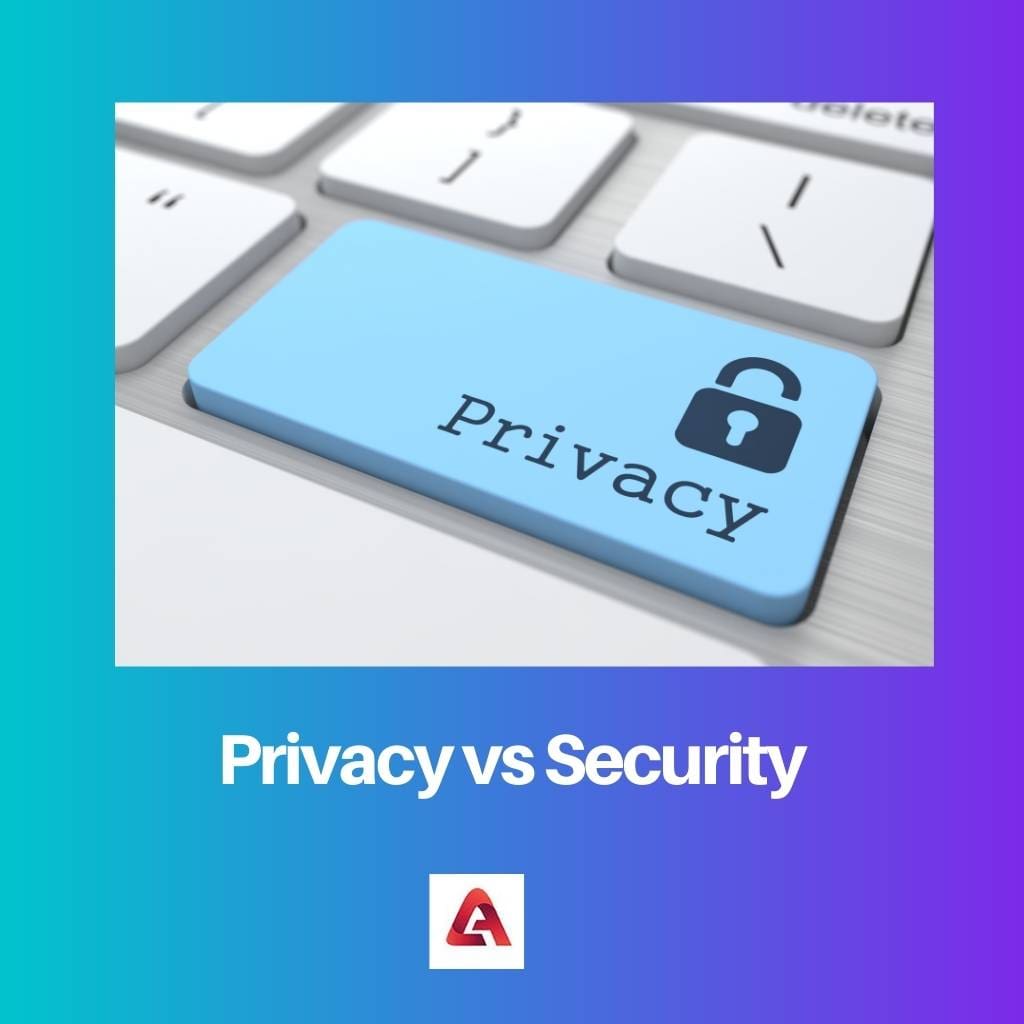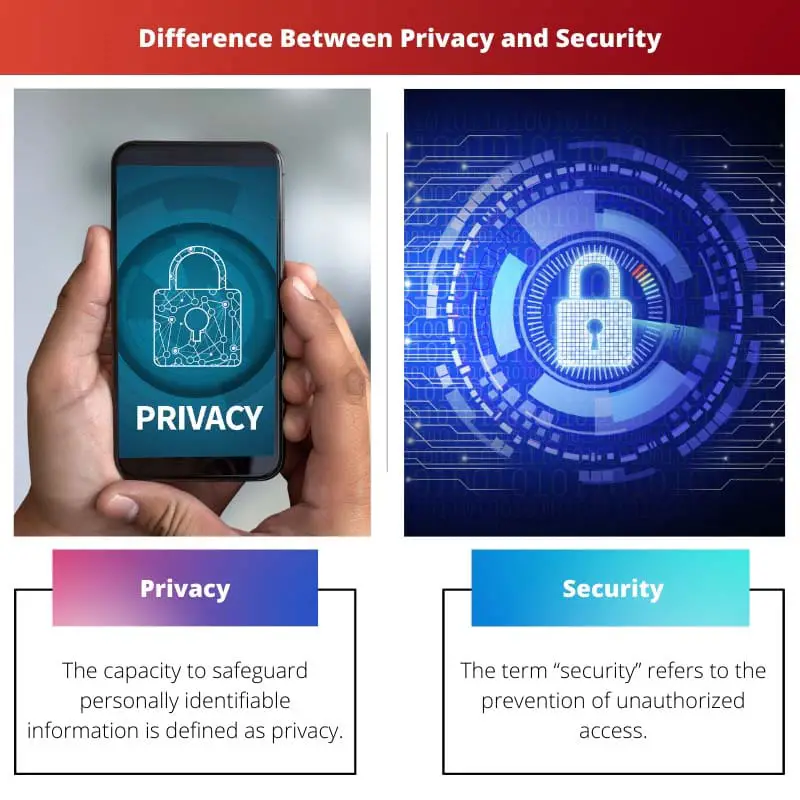Privacy and Security both terms are used in the same phrase because they are related. Many people think that the two words are synonymous and that you can’t have one without the other, while others say that you may have security without privacy but not the other way around.
Technology and networks are interchangeable words.
Key Takeaways
- Privacy refers to the right of an individual to control their personal information, while security refers to protecting that information.
- Privacy violations can result in loss of trust and reputation damage, while security breaches can lead to data loss, theft, or misuse.
- Both privacy and security are crucial for ensuring data protection and preventing unauthorized access.
Privacy vs Security
The difference between Privacy and Security is that Personal freedom of being free from potential hazards is defined as security, while privacy is defined as being free from unwanted attention. The three major security goals are confidentiality, integrity, and availability. Individual and organizational rights to personal data are referred to as privacy.

When a person refers to something as “private,” it refers to anything unique or sensitive to them. The idea of proper use and protection of information falls within the realm of privacy, which is partly overlapped with security.
Body integrity may also be a kind of privacy. Many nations’ privacy laws, and in some instances, constitutions, include the right not to be exposed to unjustified intrusions of privacy by the government, companies, or people.
Security refers to preventing unauthorized access to your information assets and sensitive data. It has an impact on both information and cybersecurity. At least one of the three objectives is addressed by all security measures.
Security is most associated with protection against hostile forces, but it may also relate to the absence of harm, the existence of a vital good, resistance against possible damage or injury, concealment, confinement, and a state of mind.
Comparison Table
| Parameters of Comparison | Privacy | Security |
|---|---|---|
| Definition | The term “security” refers to the prevention of unauthorized access. | The capacity to safeguard personally identifiable information is defined as privacy. |
| Dependency | It is not possible to obtain privacy without security. | It is possible to obtain security without privacy. |
| Programs | Personal information such as names, addresses, security numbers, login details, and financial information is the subject of the privacy program. | A security program is concerned with all types of information assets that a company generates. |
| Objective | Protecting sensitive information about individuals and organizations is what privacy entails. | All kinds of data and information, even those held electronically, are protected by security. |
| Principle | It relates to the protection of privacy rights in the context of personal data processing | It employs security procedures to ensure the confidentiality, integrity, and accessibility of information assets. |
What is Privacy?
The right to privacy is the freedom from intrusion and inquisitive eyes. It’s the condition of not being subjected to unwanted scrutiny or covert monitoring. It is a fundamental concept of human dignity.
Restricting the view preserves your privacy by preventing intruders or criminals from seeing who or what is inside. Information security, on the other hand, restricts access to personal data or information.
Privacy is a basic right that is necessary for autonomy and the preservation of human dignity, and it serves as the basis for many other human rights. Privacy allows us to set limits on who has access to our bodies, locations, and possessions, as well as our conversations and information.
Consequently, privacy is a critical component of our efforts to safeguard ourselves and society from arbitrary and unjustifiable use of power by limiting what can be known about us and what is done to us while also shielding us from those who may attempt to impose control.
Privacy is fundamental to who we are as people, and we make choices about it daily. It enables us to be ourselves without fear of being judged, and to think freely without fear of discrimination, and it is an essential part of providing us power over who knows what about us.

What is Security?
Personal independence from external influences is referred to as security. It is the condition of not being threatened or endangered.
Data security protects your critical data and information from prying eyes by encrypting passwords and documents, just as a home security system protects your house’s integrity.
The protections put in place to protect digital data from unauthorized users such as hackers and cybercriminals are referred to as security.
Technology has progressed, as have hackers, and data security measures should as well. While security cannot ensure that data or information will not be compromised, it does assist in preventing unwanted access via rigorous security procedures and processes.
As a result, it’s always a good idea to protect your online accounts using strong passwords that are distinct for each website that requires a login.
Confidentiality, integrity, and availability are the three primary objectives of security. The aim is to improve internal control and limit illegal access from both internal and external sources, ensuring the confidentiality and integrity of assets and resources.
To create strong and legitimate security rules, you must first identify your security goals, which will aid you in creating a security strategy for a secure system.

Main Differences Between Privacy and Security
- The word “security” refers to the ability to prevent unauthorized access, while “privacy” refers to the ability to protect personally identifiable information.
- It is impossible to achieve privacy without sacrificing security, yet it is possible to get security without sacrificing privacy.
- Privacy procedures are related to personal information such as names, addresses, security numbers, login details, and financial information, while security procedures are related to various information assets generated by enterprises.
- Privacy involves protecting sensitive information about people and organizations, while security is about protecting all types of data and information, even data and information stored electronically.
- It is concerned with protecting privacy rights in the context of processing personal data, and it uses security measures to guarantee the confidentiality, integrity, and accessibility of information assets.

- https://www.igi-global.com/article/privacy-security-learning/1617
- https://dl.acm.org/doi/abs/10.1145/1030083.1030112

The article effectively broadens the understanding of privacy and security, illustrating their interdependence in data protection.
Absolutely, Jmatthews. The article provides a comprehensive overview of the critical role of privacy and security in data safeguarding.
I couldn’t agree more. The article is a valuable resource for understanding the complexities of privacy and security in the digital landscape.
The article offers an insightful overview of privacy and security, elaborating on the nuances of data protection and information security.
Indeed, the article provides a comprehensive analysis of privacy and security, emphasizing their vital role in data safeguarding.
Absolutely, Mitchell. It’s crucial to comprehend the intricacies of privacy and security in today’s digital landscape.
The article profoundly outlines the core aspects of privacy and security, offering a lucid comparison between the two concepts.
The distinction between privacy and security is clearly outlined in this article, emphasizing their significance in safeguarding sensitive data.
I completely agree. Understanding the intricacies of privacy and security is crucial in today’s digital age.
The article does a great job of highlighting the fundamental aspects of privacy and security concerning data protection.
Indeed, Stewart. It’s essential to differentiate between the two concepts to ensure the safety of personal and organizational information.
The article effectively conveys the importance of privacy and security in protecting personal information and data.
Well articulated, Caroline. It’s vital to grasp the intricacies of data protection in relation to privacy and security.
Indeed, the article provides valuable insights into privacy and security, especially in the digital realm.
The article does an excellent job of elucidating the distinction between privacy and security, shedding light on their significance in data protection.
Absolutely, Iphillips. This article is an invaluable resource for comprehending the critical aspects of privacy and security.
The article delivers a detailed comparison of privacy and security, offering a comprehensive understanding of their significance in data protection.
Absolutely, Xjackson. The article provides invaluable insights into the critical aspects of privacy and security in today’s digital world.
The article perfectly explains the difference between privacy and security, and how they are related in the protection of sensitive data.
I agree with you, Anderson. It’s important to understand the nuances of these concepts in today’s digital world.
Absolutely, the details provide a comprehensive understanding of the importance of privacy and security.
The article provides a comprehensive understanding of privacy and security, emphasizing their pivotal role in safeguarding sensitive data.
I completely agree, Sasha. The article effectively delineates the importance of privacy and security in data protection.